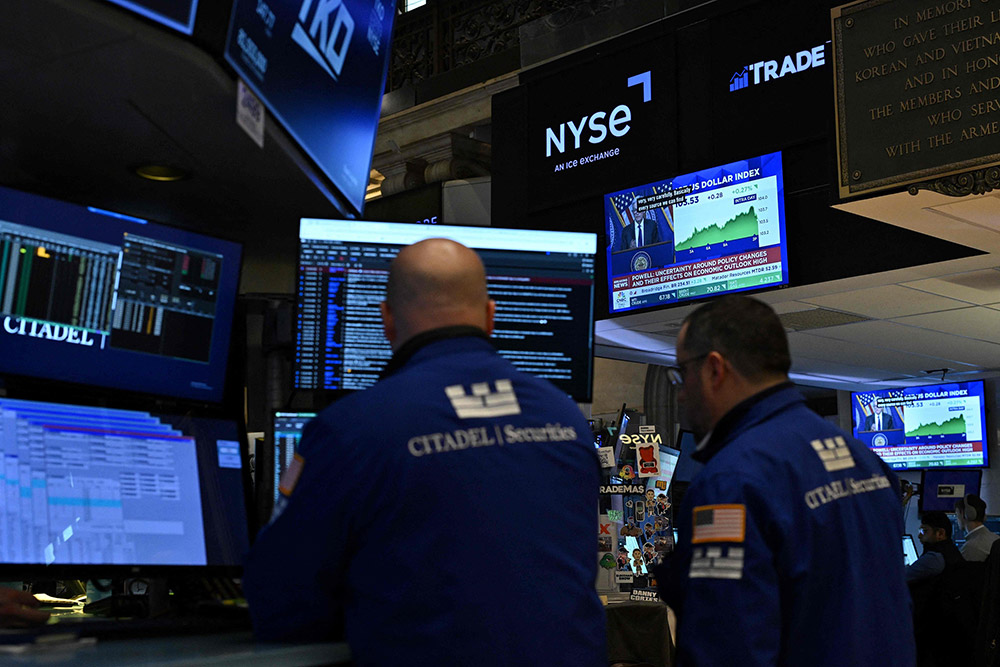
特朗普发动本轮关税战以来,美国股市和债券市场相继崩盘,令金融界人心惶惶。但是受影响的还不只是美元和美债,就连美元自身的地位也岌岌可危。有分析师警告称,由于特朗普政府反复无常的对外政策,很可能导致全球出现“去美元化”现象。
德意志银行全球外汇研究总监乔治・萨拉韦洛斯在上周的一份报告中写道:“我们正在见证所有美国资产价格的同时暴跌,包括证券、美元(汇率)和债券市场。全球金融体系正在进入一个未知的领域。”
即便市场暴跌,债券收益率上升,但是美元汇率仍在上周跌至近三年的最低点。萨拉韦洛斯表示,在典型的市场环境下,一旦遇到这种情况,市场就会“囤积”美元,作为对抗其他风险因素的“避风港”,美元便会随之升值。但是这次,特朗普给全球市场带来的冲击远非寻常。现在其他国家已经失去了对美国的信心,而且都在减持美国资产,这很有可能动摇美元作为全球储备货币的地位。
这是个值得关注的问题。美元的特殊性,来自其他国家的“补贴”。美国每年获得的外国投资高达2万亿美元,这些外国投资者既包括个人也包括外国政府,他们持有美债总额的30%。他们纷纷撤资离场,是一件值得担忧的事。因为当下美国国债规模还在水涨船高,外国抛售的行为很可能会导致美国的借贷成本进一步上升。
如果这一届美国政府仍然致力于维持美元的储备货币地位,那么分析师们就用不着如此担忧近期的市场波动了。但是白宫经济顾问委员会主席斯蒂芬・米兰在上周的一次讲话中表示,维持美元的主导地位“要付出高昂的代价”,并且会导致美国的劳动力和产品失去竞争力。
那么,投资者该何去何从呢?富国银行投资研究所的全球策略师加里・施洛斯伯格表示,有的投资者已经把目光投向了黄金、德国国债、瑞士法郎和日元等资产。
不过,施洛斯伯格也指出,现在还不到对美元完全失去信心的时候,美元市场崩溃并不是一件马上就会发生的事,目前美元的颓势是可以逆转的。虽然过去几个月,美元地位已经遭到了相当大的损害,但美元特殊性的支柱因素仍然存在。相比于其他任何一个市场,美国市场仍然更有深度,更有流动性,也更发达和高效。尽管有人认为欧元有可能成为美元的替代货币,但是欧洲的分裂程度远甚于美国,甚至还面临着解体的风险。
施洛斯伯格表示:“当然,目前存在资金逃出美国的情况。”这反映了市场内部的深层不安,但是“美元仍将是核心货币,市面上也几乎没有能代替它的货币。”
全球对美国的信心动摇了
话虽如此,但是包括施洛斯伯格在内的分析师们都指出,当前的市场环境与以前的几次市场动荡有着显著的不同。以2011年美国国债信用评级下调为例。当时,投资者并未过度在意此事,依然将美元视为稳定的“避风港“,从而避免了市场的失控。在2008年金融危机期间,各国政府也能携手共克时艰。
但特朗普政府的关税政策,以及不顾实际硬搞所谓的“制造业回流”的做法,却颠覆了几十年来各国达成共识,并且威胁到了美国作为全球事实领导者的地位。其影响很可能是长期的。
施洛斯伯格表示:“特朗普的做法,基本上就是要在一定程度上让美国自外于全球经济。我并不是说,二战以来的贸易和支付体系已经到了崩溃的边缘了,但特朗普这样做的确会制造不确定性。”
而特朗普政策的多变性,又进一步加剧了这种不确定性。在短短几周内,他的关税政策朝令夕改,一时增税,一时暂缓,一会儿挥大棒,一会儿扔胡萝卜。目前,美国政府对大多数国家全面征收10%的关税,但是对中国征收了145%的关税。这一切都是以行政令的方式发布的,而不是由国会通过法律,所以这些政策具有极大的随意性,很容易朝令夕改。这些都削弱了国际社会对美国的信任。即便这些政策都被纠正了,对美国信用的损害也很难消除。有分析人士认为,特朗普的这番折腾,最大的赢家是欧元和日元。
施洛斯伯格表示,投资者如果对当前的市场环境感到担忧,不妨跟理财顾问谈谈自己的感受,问他们对市场环境变化的看法。不过至少就目前而言,有一些基本原则是仍然适用的。比如你可以多元化配置资产,既投资美国资产,也投资国际资产,可以考虑将黄金作为“避风港”,或者短期考虑增加现金配置。总之,市场环境是瞬息万变的,千万不要为了寻找替代投资而急躁冒进。
最后,施洛斯伯格说:“乐观地看,这一些都会过去的,所有这些人为的动荡都会结束。明天不会是世界末日。我的意思是,这一切也许周一就会逆转。”(财富中文网)
译者:朴成奎
特朗普发动本轮关税战以来,美国股市和债券市场相继崩盘,令金融界人心惶惶。但是受影响的还不只是美元和美债,就连美元自身的地位也岌岌可危。有分析师警告称,由于特朗普政府反复无常的对外政策,很可能导致全球出现“去美元化”现象。
德意志银行全球外汇研究总监乔治・萨拉韦洛斯在上周的一份报告中写道:“我们正在见证所有美国资产价格的同时暴跌,包括证券、美元(汇率)和债券市场。全球金融体系正在进入一个未知的领域。”
即便市场暴跌,债券收益率上升,但是美元汇率仍在上周跌至近三年的最低点。萨拉韦洛斯表示,在典型的市场环境下,一旦遇到这种情况,市场就会“囤积”美元,作为对抗其他风险因素的“避风港”,美元便会随之升值。但是这次,特朗普给全球市场带来的冲击远非寻常。现在其他国家已经失去了对美国的信心,而且都在减持美国资产,这很有可能动摇美元作为全球储备货币的地位。
这是个值得关注的问题。美元的特殊性,来自其他国家的“补贴”。美国每年获得的外国投资高达2万亿美元,这些外国投资者既包括个人也包括外国政府,他们持有美债总额的30%。他们纷纷撤资离场,是一件值得担忧的事。因为当下美国国债规模还在水涨船高,外国抛售的行为很可能会导致美国的借贷成本进一步上升。
如果这一届美国政府仍然致力于维持美元的储备货币地位,那么分析师们就用不着如此担忧近期的市场波动了。但是白宫经济顾问委员会主席斯蒂芬・米兰在上周的一次讲话中表示,维持美元的主导地位“要付出高昂的代价”,并且会导致美国的劳动力和产品失去竞争力。
那么,投资者该何去何从呢?富国银行投资研究所的全球策略师加里・施洛斯伯格表示,有的投资者已经把目光投向了黄金、德国国债、瑞士法郎和日元等资产。
不过,施洛斯伯格也指出,现在还不到对美元完全失去信心的时候,美元市场崩溃并不是一件马上就会发生的事,目前美元的颓势是可以逆转的。虽然过去几个月,美元地位已经遭到了相当大的损害,但美元特殊性的支柱因素仍然存在。相比于其他任何一个市场,美国市场仍然更有深度,更有流动性,也更发达和高效。尽管有人认为欧元有可能成为美元的替代货币,但是欧洲的分裂程度远甚于美国,甚至还面临着解体的风险。
施洛斯伯格表示:“当然,目前存在资金逃出美国的情况。”这反映了市场内部的深层不安,但是“美元仍将是核心货币,市面上也几乎没有能代替它的货币。”
全球对美国的信心动摇了
话虽如此,但是包括施洛斯伯格在内的分析师们都指出,当前的市场环境与以前的几次市场动荡有着显著的不同。以2011年美国国债信用评级下调为例。当时,投资者并未过度在意此事,依然将美元视为稳定的“避风港“,从而避免了市场的失控。在2008年金融危机期间,各国政府也能携手共克时艰。
但特朗普政府的关税政策,以及不顾实际硬搞所谓的“制造业回流”的做法,却颠覆了几十年来各国达成共识,并且威胁到了美国作为全球事实领导者的地位。其影响很可能是长期的。
施洛斯伯格表示:“特朗普的做法,基本上就是要在一定程度上让美国自外于全球经济。我并不是说,二战以来的贸易和支付体系已经到了崩溃的边缘了,但特朗普这样做的确会制造不确定性。”
而特朗普政策的多变性,又进一步加剧了这种不确定性。在短短几周内,他的关税政策朝令夕改,一时增税,一时暂缓,一会儿挥大棒,一会儿扔胡萝卜。目前,美国政府对大多数国家全面征收10%的关税,但是对中国征收了145%的关税。这一切都是以行政令的方式发布的,而不是由国会通过法律,所以这些政策具有极大的随意性,很容易朝令夕改。这些都削弱了国际社会对美国的信任。即便这些政策都被纠正了,对美国信用的损害也很难消除。有分析人士认为,特朗普的这番折腾,最大的赢家是欧元和日元。
施洛斯伯格表示,投资者如果对当前的市场环境感到担忧,不妨跟理财顾问谈谈自己的感受,问他们对市场环境变化的看法。不过至少就目前而言,有一些基本原则是仍然适用的。比如你可以多元化配置资产,既投资美国资产,也投资国际资产,可以考虑将黄金作为“避风港”,或者短期考虑增加现金配置。总之,市场环境是瞬息万变的,千万不要为了寻找替代投资而急躁冒进。
最后,施洛斯伯格说:“乐观地看,这一些都会过去的,所有这些人为的动荡都会结束。明天不会是世界末日。我的意思是,这一切也许周一就会逆转。”(财富中文网)
译者:朴成奎
A tariff-induced meltdown of U.S. equity and bond markets has been spooking financial circles. But stocks and Treasuries aren’t the only assets on the fritz—the U.S. dollar is also falling, with analysts warning of a global “de-dollarization” in response to the Trump administration’s frenetic foreign policy decisions.
“We are witnessing a simultaneous collapse in the price of all U.S. assets including equities, the dollar versus alternative reserve [foreign exchange], and the bond market,” writes George Saravelos, global head of FX research at Deutsche Bank, in a note this week. “We are entering unchart[ed] territory in the global financial system.”
Even as markets tank and bond yields rise, the dollar is down to a three-year low this week. In a more typical environment, markets would be “hoarding” dollars as a safe haven from the other noise, says Saravelos, and the dollar would be strengthening. But what Trump has unleashed on global markets is far from typical. Now, other countries are losing faith in the U.S. and actively selling down U.S. assets, possibly upending the dollar’s global reserve status.
This is a problem, as the U.S. dollar’s exceptionalism is subsidized by other countries: Foreigners invest nearly $2 trillion in the U.S. every year. Foreign investors, both individuals and governments, own 30% of U.S. debt. Seeing them heading for the exits is cause for major concern, not least because it could lead to increased borrowing costs for the U.S. at a time when the national debt is ballooning.
Analysts would be less worried about the recent volatility if the U.S. government was committed to maintaining the dollar’s reserve status. But Stephen Miran, chair of the White House Council of Economic Advisers, gave a speech this week in which he said the primacy of USD is “costly,” alleging it makes U.S. labor and products uncompetitive.
So where does that leave investors? Some are looking for reassurance in assets like gold, German bunds, Swiss francs, and the Japanese yen, says Gary Schlossberg, global strategist at Wells Fargo Investment Institute.
But it isn’t time to give up all faith in the USD, he says—market collapse isn’t imminent. The current erosion in its strength can still be reversed. Because although considerable damage has been done over the past few months, the pillars of U.S. exceptionalism are still in place: The U.S. market is still deeper, more liquid, more developed, and more efficient than any other. Though some have positioned the euro as a possible alternative, Europe is far more fragmented than the U.S., and faces risks of disintegration.
“Certainly there is a withdrawal from the U.S.,” says Schlossberg, noting that it’s a reflection of the deep unease within markets. But “the dollar is going to remain the centerpiece. There are so few alternatives out there.”
Global confidence in the U.S. is shaken
That said, Schlossberg and other analysts have noted that the current market environment is substantially different from previous shocks. Take the 2011 credit downgrade of U.S. Treasury debt. At that time, investors looked through it, and still considered the dollar a stable safe haven, preventing a rollover of the market. During the 2008 financial crisis, governments came together to right the ship.
But the Trump administration’s tariff policies and intention to silo U.S. manufacturing from other countries is a different beast, upending decades of agreed-upon rules and threatening the U.S.’s role as the world’s de facto leader. The ramifications are likely to be longer-term.
“You’re talking about basically removing, by degree, the U.S. from the global economy,” Schlossberg says. “I don’t mean to suggest that we’re on the verge of a collapse in the trade and payment system that goes back to World War II, but it just creates uncertainty.”
Creating even more uncertainty is how fluid Trump’s policies have been. Within just a few weeks, he has implemented tariffs, changed them multiple times, and now frozen some of them, although the blanket 10% tariff on most countries and 145% tariff on China is currently in place. As all of this has been done by executive order—and not codified by Congress into law, though tariffs are in its purview—it can easily be rescinded or replaced, as Trump himself has already done. All of this is eroding trust in the U.S., which will be hard to undo even if all of the policies were reversed. The big winners from all of this are the euro and the yen, analysts say.
Schlossberg says jittery investors should talk through their feelings with a financial advisor, and get their read on how they view the market environment changing. But for now at least, the fundamentals remain: Diversify your holdings to include both U.S. and international exposure, consider gold as a safe haven, and consider upping your cash allocation for the time being. Don’t get “too over your skis” trying to find alternatives in a rapidly changing environment.
“Optimistically you can say, this too shall pass, the turbulence that’s been created. It’s not Armageddon tomorrow,” says Schlossberg. “I mean, this may reverse on Monday.”






